 Libri di Gordon Williamson su Unilibro.it) Libri di Gordon Williamson su Unilibro.it)
|
|
2024 |
 Title :
Le navi da guerra di Hitler
Title :
Le navi da guerra di HitlerAuthor: Williamson Gordon Publisher: LEG Edizioni Seppur vittima del Trattato di Versailles, che aveva inflitto pesanti restrizioni al comparto militare, negli anni Trenta la marina tedesca fu protagonista di un importante programma di riarmo che coinvolse la costruzione di moderne navi da guerra, dando impulso all'innovazione tecnologica. Dopo anni di sviluppo segreto, nonostante fossero stati severamente vietati, i sottomarini divennero una delle armi più letali della Kriegsmarine. Macchiate dal sangue della guerra civile spagnola, le navi di superficie continuarono a svolgere un ruolo cruciale allo scoppio della Seconda guerra mondiale, durante le invasioni di Polonia e Norvegia, sebbene le gravi perdite subite avessero ostacolato i piani per l'invasione della Gran Bretagna, tanto che, alla fine del conflitto, agli Alleati rimase da spartirsi solo una manciata di navi. Dall'inizio degli scontri, ma soprattutto dopo la caduta della Francia, i temutissimi ed efficacissimi U-Boote presidiarono l'Atlantico minacciando i convogli di navi britanniche e soffocando la linea di munizioni e rifornimenti dagli Stati Uniti, indispensabile per la sopravvivenza dell'avversario. Questo volume, riccamente illustrato, rappresenta uno studio completo e approfondito della Kriegsmarine durante la guerra, capace di svelare i punti di forza ma soprattutto quelli di fatale debolezza che portarono alla disfatta dell'esercito tedesco durante la Seconda guerra mondiale. € 28,00
Scontato: € 26,60
|
|
|
2018 |
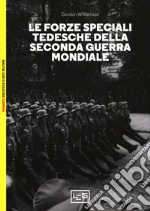 Title :
Forze speciali tedesche della seconda guerra mondiale
Title :
Forze speciali tedesche della seconda guerra mondialeAuthor: Williamson Gordon Publisher: LEG Edizioni Uno studio accurato sulle truppe che costituirono le forze d'élite della Germania nel corso della seconda guerra mondiale. Tra esse, il leggendario 'Commando Skorzeny' con le sue imprese audaci, come la liberazione di Mussolini e il rapimento del figlio dell'ammiraglio Horty, reggente ungherese. Il libro include la storia dettagliata di unità meno conosciute come i Brandenburgers, che operavano come infiltrati dietro le linee nemiche, e la Kleinkampfverbände, gruppo precursore dei Navy Seals statunitensi per molti aspetti. Azioni, addestramento e tecniche sono descritte insieme a uniformi ed equipaggiamento, così da non trascurare alcun aspetto. € 18,00
|
|
|
1917 |
 Title :
Doctor Who the Fourth Doctor 1
Title :
Doctor Who the Fourth Doctor 1Author: Rennie Gordon, Beeby Emma, Williamson Brian (ILT) Publisher: Titan Books € 15,20
|
 Title :
Doctor Who: The Fourth Doctor 1
Title :
Doctor Who: The Fourth Doctor 1Author: Rennie Gordon, Beeby Emma, Williamson Brian (ILT) Publisher: Titan Books € 17,90
|
|
1916 |
 Title :
Battles of the Waffen-SS
Title :
Battles of the Waffen-SSAuthor: Williamson Gordon Publisher: Amber € 27,70
|
 Title :
Personal Accounts of the Waffen-ss at War
Title :
Personal Accounts of the Waffen-ss at WarAuthor: Williamson Gordon Publisher: Amber € 26,80
|
|
1915 |
 Title :
Hans Sturm
Title :
Hans SturmAuthor: Williamson Gordon Publisher: Fonthill Media € 35,70
|
|
|
1913 |
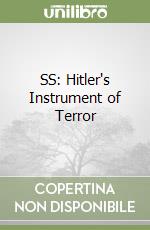 Title :
SS: Hitler's Instrument of Terror
Title :
SS: Hitler's Instrument of TerrorAuthor: Gordon Williamson Publisher: Amber Books Ltd € 23,70
|
|
|
1911 |
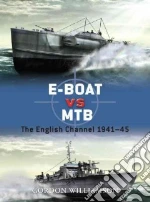 Title :
E-Boat vs MTB
Title :
E-Boat vs MTBAuthor: Williamson Gordon, Palmer Ian (ILT), Gerrard Howard (ILT) Publisher: Osprey Pub Co During WWII, German E-Boats were so active in the English Channel that the narrow stretch of water became known as 'E-Boat Alley'. To counter the threat of these E-Boats, Britain brought its coastal forces to bear - flotillas of small Motor Torpedo and Gun Boats (MTBs and MGBs) and Motor Launches (MLs). As the Germans sought to maintain their supremacy in Channel waters, they continued to develop their E-Boat designs to accommodate more armor and more firepower. Rather than matching the newer E-Boats for armament, the British developed several types to fulfill the varied roles for which the Kriegsmarine were attempting to use the E-Boat. This book details this developing conflict, examining the evolution of the boats involved, and covering the their battles from fights in the Thames estuary to the build-up for D-Day. € 17,60
|
|
|
1910 |
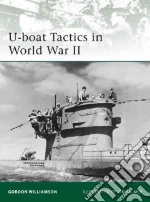 Title :
U-boat Tactics in World War II
Title :
U-boat Tactics in World War IIAuthor: Williamson Gordon, Palmer Ian (ILT) Publisher: Osprey Pub Co Osprey's elite title on Germany's U-Boat tactics during World War II (1939-1945). At the start of the war, German U-boat technology vastly out performed that possessed by the Allies, and under the pressure of the war continual development helped keep pace with wartime needs and improvements in anti-submarine weaponry. But it was not just the technology that had to change. German U-boat tactics evolved over time. Used in a variety of roles, from coastal patrolling through to the combined actions of convey-hunting 'wolf packs', the tactics used by U-Boats were diverse. This book analyses how the U-boats dominated the seas thanks to their innovative and daring tactical deployment, and how the cracking of the Enigma code effectively hamstrung them, greatly reducing their impact, a problem that even their advanced tactics failed to solve. € 18,60
|
|
|
2009 |
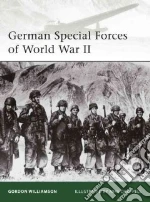 Title :
German Special Forces of World War II
Title :
German Special Forces of World War IIAuthor: Williamson Gordon, Chappell Mike (ILT) Publisher: Osprey Pub Co Osprey's study of the troops that made up Germany's elite special forces of World War II (1939-1945). Such forces included the legenday Skorzeny Commandos who carried out such audacious tasks as the glider-borne rescue of Mussolini, and the kidnapping of the son of the Hungarian regent, Admiral Horthy. This book also includes details of lesser-known units such as the Brandenburgers, who operated behind enemy lines in captured uniforms, and the Kleinkampfverbände who were the forerunners of modern-day naval combat troops like the US Navy SEALs. Complete with uniform and kit detail together with action accounts of many of these daring operations, this book is a must-have for any special forces enthusiast. € 17,60
|
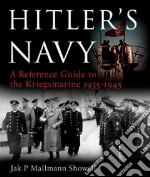 Title :
Hitler's Navy
Title :
Hitler's NavyAuthor: Showell Jak P. mallmann, Williamson Gordon (CON) Publisher: Naval Inst Pr Renowned naval historian Showell is the author of 20-plus books on the German Navy and U-boat operations. Based on his 1979 The German Navy in World War Two, his latest text incorporates new information that has come to light in the past 30 years and covers major aspects of German naval history, the organization of the Kriegsmarine, the organization of the German fleet, ships of the German fleet, U-boats at sea, technical data, and rank, uniforms, awards, and insignia. It also includes brief biographies of key figures, a chronology of events from 1918 to 1945, a glossary, and an extensive bibliography. Illustrated throughout with b&w and color photographs. Academic but accessible to the general reader. Oversize: 10x11.75'. Annotation ©2009 Book News, Inc., Portland, OR (booknews.com) € 66,90
|
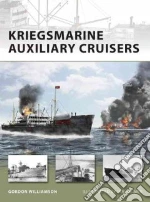 Title :
Kriegsmarine Auxiliary Cruisers
Title :
Kriegsmarine Auxiliary CruisersAuthor: Gordon Williamson Publisher: OSPREY Despite the popularity of the U-boats and larger surface vessels like the Bismarck and the Graf Spree, the vast majority of vessels within the Kriegsmarine served in the coastal forces. Though the public may generally have forgotten these smaller ships, many gave crucial service during the war and continued to serve decades after VE day, either in the German Navy or in the navies of the victorious Allies. Indeed, Kriegsmarine minesweepers and their German crews, still in their old uniforms with the swastikas simply removed, continued to serve after 1945 under the control of the Royal Navy, engaged in the dangerous but necessary task of clearing old wartime minefields. The ships and boats included in the coastal forces ranged from such minesweepers to torpedo boats, patrol boats and blockade breakers. These latter were merchant vessels, whose daunting task was to evade the Allied warships to bring essential supplies into Germany. Also included in the coastal forces was Hitler's personal yacht, the Ostwind. This book tells the often-forgotten story of the vessels that formed the backbone of the Kriegsmarine, and combines fascinating anecdotes, detailed technical information, and full-color artwork. € 13,30
|
|
2006 |
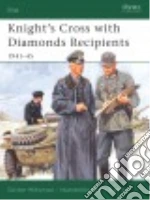 Title :
Knight's Cross with Diamonds Recipients
Title :
Knight's Cross with Diamonds RecipientsAuthor: Williamson Gordon, Bujeiro Ramiro (ILT) Publisher: Osprey Pub Co Osprey's examination of the recipients of the Knight's Cross with Diamonds award of World War II (1939-1945). On 1 September 1939, the Knight's Cross of the Iron Cross was created by Hitler. It could be distributed to all ranks within any branch of the Wehrmacht, Waffen-SS or the auxiliary services, and it was the highest award that the Third Reich could offer. During the war, new grades of Knight's Cross were added. The Diamonds were introduced on 28 September 1941, and were the next highest grade above the Oakleaves and Swords. Only 27 awards of Diamonds were made during the war creating an elite echelon of war heroes and many of the awards were made for acts of extreme bravery which are detailed in this volume. € 17,80
|
 Title :
Luftwaffe Handbook 1935-1945
Title :
Luftwaffe Handbook 1935-1945Author: Gordon Williamson Publisher: Sutton Publishing Ltd Detailed reference to the German Air Force of the Second World War. € 29,40
|
|
2005 |
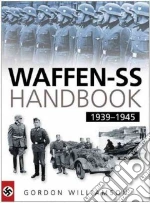 Title :
Waffen-SS Handbook 1933-1945
Title :
Waffen-SS Handbook 1933-1945Author: Gordon Williamson Publisher: Sutton Publishing Ltd Originating in Hitler's personal bodyguard, the Waffen-SS (armed SS) was expanded as a fourth branch of the Wehrmacht and became regarded as the tough elite of the German armed forces. Known as Hitler's 'Asphalt Soldiers' they fought on all the main battle-fronts, but most notably in the East against the Soviet Union and in Normandy following 'Overlord'. By the war's end the Waffen-SS could boast almost forty field divisions manned by nearly one million troops. Gordon Williamson describes the organisation, equipment, tactics and personalities of the Waffen-SS in the Second World War. A chronology outlines the major events in the history of the Waffen-SS from the founding of its forerunner, the SS-Verfugungstruppe, until May 1945. The author has travelled to Germany to interview numerous surviving former Waffen-SS soldiers and corresponded with many others, obtaining first-hand accounts of their wartime experiences. The handbook is illustrated with a rich selection of previously unpublished photographs, predominantly from private collections, ranging from studio posed shots to previously unpublished candid snaps and from battlefield pictures to war correspondent action shots. € 19,70
|
|
|
2004 |
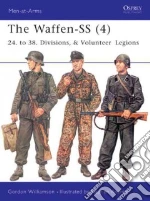 Title :
The Waffen-ss 4
Title :
The Waffen-ss 4Author: Williamson Gordon, Andrew Stephen (ILT), Windrow Martin (EDT) Publisher: Osprey Pub Co In 1944–45 the Waffen-SS formed many nominal 'divisions' from a motley range of sources, whose battlefield value was as varied as their backgrounds. The best were built around existing Western European volunteer regiments; some, raised from Central Europeans and Russians, were strong in numbers but weak in morale; some were of negligible size, scraped together from remnants and trainees; and some were sinister 'anti-partisan' gangs, assembled from the military dregs of the Eastern Front. Illustrated with rare photographs from private collections and meticulous colour artwork, this final title in our sequence details their organisation, uniforms and insignia, and summarises their battle records. € 16,80
|
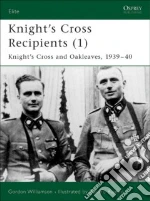 Title :
Knight's Cross And Oak-leaves Recipients 1939-1940
Title :
Knight's Cross And Oak-leaves Recipients 1939-1940Author: Williamson Gordon, Bujeiro Ramiro (ILT) Publisher: Osprey Pub Co Osprey's survey of the recipients of the Knight's Cross and Oak-Leaves awards during World War II (1939-1945). In 1939 a new grade in the Iron Cross series was introduced, the Knight's Cross of the Iron Cross (Ritterkreuz des Eisernen Kreuzes). It was awarded for a variety of reasons, from skilled leadership to a single act of extreme gallantry, and was bestowed across all ranks, grades, and branches of service. As the war progresed, further distinctions were created for bestowal on existing winners, namely Oak-Leaves (Eichenlaub); Oak-Leaves with Swords (Eichenlaub und Schwertern); and Oak-Leaves with Swords and Diamonds (Eichenlaub, Schwerter und Brillanten). This book, the first in a sequence of four, covers winners of the Knights Cross and the Oak-Leaves distinction in the period 1939-40. € 17,60
|
|
2003 |
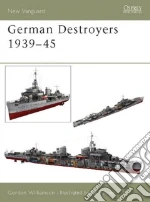 Title :
German Destroyers 1939-1945
Title :
German Destroyers 1939-1945Author: Williamson Gordon, Palmer Ian (ILT) Publisher: Osprey Pub Co The German destroyer fleet of World War II consisted of nine classes: the Diether Von Roeder Class, the Leberecht Maas Class and the wartime classes Z23, Z35, Z37, Z40, Z43, Z46 and Z52. These vessels, though fewer in number than the British destroyer fleet, tended to be much bigger and more powerful than their allied counterparts. They served their country well in operations in the Channel, North Sea, the Far North and in the rescue of civilians from East Prussia during the final days of the war. This title describes their design, development and operational use from the fjords of Narvik to the final days of the war. € 16,60
|
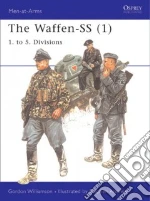 Title :
The Waffen-Ss
Title :
The Waffen-SsAuthor: Williamson Gordon, Andrew Stephen (ILT) Publisher: Osprey Pub Co Despite being disdained by the German Army's professional officer corps, the military branch of the Nazi SS security organisation grew from an initial strength of only a handful of battalions at the outbreak of World War II in 1939, to hundreds of thousands of troops in dozens of divisions. The battlefield reputation of the premier armoured and mechanised divisions would become second to none; lavishly equipped and regarded as utterly reliable, they were thrown into many desperate battles on both Western and Eastern fronts, often achieving remarkable results. Illustrated with rare photographs, this first of four Men-at-Arms titles details the organisation, uniforms and insignia of the Waffen-SS. € 16,80
|
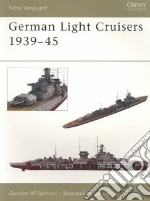 Title :
German Light Cruisers 1939-1945
Title :
German Light Cruisers 1939-1945Author: Williamson Gordon, Palmer Ian (ILT) Publisher: Osprey Pub Co The German Navy of World War II was small in number, but contained some of the most technologically advanced capital ships in the world. This meant that although the Kriegsmarine never felt capable of encountering the might of the British Navy in a fleet action, her ships were individually more than a match for the outdated vessels of the Royal Navy. Nowhere was this more the case than in Germany's fleet of light cruisers. There were only six vessels in this fleet: the Emden, Leipzig, Köln, Königsberg, Karlsruhe and Nurnberg. This book describes their design, development and varied operational history throughout the course of the Second World War. € 16,30
|
 Title :
Gebirgsjager
Title :
GebirgsjagerAuthor: Williamson Gordon, Pavlovic Darko (ILT) Publisher: Osprey Pub Co Few branches of the German armed forces were represented on so many fronts as the mountain infantrymen, or Gebirgstruppen. From the Blitzkrieg campaigns of 1940, through the invasions of the Balkans and Russia and the North African campaign, to the defence of the Reich 1944-45, the Gebirgsjäger earned a reputation for reliability and courage. Typically each trooper was a supremely fit individual: the need to cover difficult terrain in full kit, without the back-up of a motorised baggage train, demanded this. This new volume examines the recruitment, training, and combat experiences of the common Gebirgsjäger. € 17,20
|
 Title :
World War II German Women's Auxiliary Services
Title :
World War II German Women's Auxiliary ServicesAuthor: Williamson Gordon, Buheiro Ramiro (ILT) Publisher: Osprey Pub Co Under the Nazi regime, Hitler's conservative views on the place of housewives and mothers in society limited German women to a much less active role in World War II (1939-1945) than their British and Allied counterparts. Nevertheless, the demands of a prolonged war did see German women in a range of uniforms as auxiliaries with the Army, Navy, Air Force and SS, particularly in the signals and air defence services. This unique book explains and illustrates these organisations and their uniforms and insignia, as well as Red Cross nurses, and auxiliaries of the Labour Corps, Customs Service, National Socialist Women's Organisation, and League of German Maidens (Hitler Youth). € 16,60
|
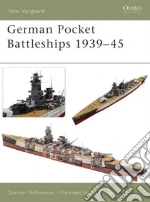 Title :
German Pocket Battleships 1939-45
Title :
German Pocket Battleships 1939-45Author: Williamson Gordon, Palmer Ian (ILT) Publisher: Osprey Pub Co After the end of World War I, the German Navy came up with the concept of the Panzerschiffe, or Pocket Battleship, as a method of circumventing treaty limitations on the size and types of ship Germany was permitted to build. New, more modern production methods, where welded construction prevailed over the older riveting process, were combined with the development of modern engines capable of fast speeds and a very powerful armament, far superior to that on any enemy Cruisers. This book covers these three sister ships, the 'Deutschland', the 'Admiral Graf Spee' and the 'Admiral Scheer', which formed the core of the Kriegsmarine's fighting power at the start of World War II. € 17,60
|
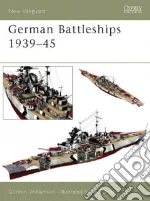 Title :
German Battleships 1939-45
Title :
German Battleships 1939-45Author: Williamson Gordon, Palmer Ian (ILT) Publisher: Osprey Pub Co In this, the first of a five volume series covering the capital ships of the German Navy of World War II, Gordon Williamson examines the design, development and operational use of the battleships used by the Kriegsmarine. The 'Schlesien' and 'Schleswig-Hostein' were used mostly as training ships until the end of the war when they took part in bombardment of Soviet troop movements in East Prussia. The 'Scharnhorst' had a successful career until her sinking at the battle of the North Cape, and the 'Gneisenau' with her ignominious end as a block-ship. Bismarck's short but glorious career and Tirpitz's lonely vigil in Norway's distant Fjords until sunk by RAF bombers using the massive 'Tallboy' bombs are also covered. € 16,60
|
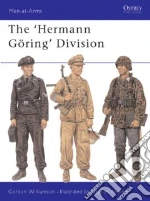 Title :
The Hermann Goring Division
Title :
The Hermann Goring DivisionAuthor: Williamson Gordon, Andrew Stephen (ILT) Publisher: Osprey Pub Co Each of Germany's World War II armed services could claim one unit which earned a unique combat reputation, and which consequently was enlarged and developed far beyond the size originally planned. Hermann Göring, commander-in-chief of the air force, was determined that his Luftwaffe should share the glory of Germany's land conquests, and gave his name to a regimental combat group of infantry and Flak artillery. This élite unit was steadily enlarged into a brigade, then an armoured division, and finally into a two-division corps, fighting with distinction in Tunisia, Sicily, Italy, and on the Russian Front. This concise history is illustrated with rare personal photographs and eight colour plates, detailing the very varied uniforms and special insignia of this crack formation. € 16,30
|
|
|
2002 |
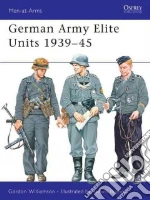 Title :
German Army Elite Units 1939-45
Title :
German Army Elite Units 1939-45Author: Williamson Gordon, Bujeiro Ramiro (ILT) Publisher: Osprey Pub Co In World War II a number of German Army units and divisions were classed as élites, and were distinguished by special insignia of various kinds. For some this status was simply a matter of lineage - e.g. the Infantry Regiment 'List', which traced its identity to the Bavarian unit with which Hitler had served in World War I. Some, like the 'Grossdeutschland' and Panzer-Lehr divisions, were raised from particularly high grade personnel. Other titles honoured extraordinary battlefield exploits or heroic sacrifice, like the 'Brandenburg' and 'Hoch und Deutschmeister' divisions. This fact-packed introduction to these famous units is illustrated with rare photographs and detailed colour plates. € 16,60
|
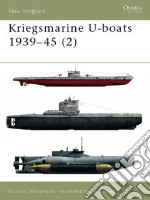 Title :
Kriegsmarine U-Boats 1939-45
Title :
Kriegsmarine U-Boats 1939-45Author: Williamson Gordon, Palmer Ian (ILT) Publisher: Osprey Pub Co This title follows from New Vanguard 51: Kriegsmarine U-boats 1939–45 (1) and charts the continuing development of the U-boat in German service, including the evolution of the Type IX as a long range 'cruiser' intended for solo operations in distant waters. Also covered is the revolutionary Type XXI, conceived of in 1942 and launched in April 1944, the first true submarine rather than submersible, whose arrival was just too late to influence the war. Other vessels covered are the Type XXIII, a small vessel armed with only two torpedoes but technically highly advanced, and the Type X minelayers, which were rarely used in their intended role and more often used as supply boats. € 16,10
|
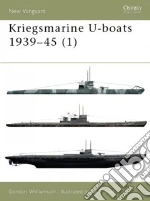 Title :
Kriegsmarine U-boats 1939-45 - 1
Title :
Kriegsmarine U-boats 1939-45 - 1Author: Williamson Gordon, Palmer Ian (ILT) Publisher: Osprey Pub Co This, the first of two volumes on Germany's World War II U-boats, traces their development from the early U-boats of the Kaiser's Navy, the prohibition on Germany having U-boats following the Armistice in 1918 and the subsequent Treaty of Versailles, the secret development of U-boats using a 'cover-firm' in Holland, culminating in the formation of the 1st U-boat Flotilla in 1935 with the modern Type II. The operational history section includes examples from the Classes Type VIIA, Type VIIB, VIID, VIIE and VIIF before concentrating on the mainstay of the U-boat arm, the Type VIIC. Comparisons are also made with the standard allied submarines, their strengths, weaknesses and U-boat tactics. € 12,00
|
 Title :
Panzer Crewman 1939-45
Title :
Panzer Crewman 1939-45Author: Williamson Gordon, Vuksic Velimir (ILT) Publisher: Osprey Pub Co In World War II (1939-1945), the Panzer crews spearheaded every major campaign or battle from the invasions of Poland and France to the last great counter-offensive in the Ardennes. Germany's Panzer crews fought on every front and along the way earned a formidable reputation for élan in attack and steadfastness in defence. This book charts the recruitment, training, service conditions and combat experience of a typical World War II German tank crewman, serving on various fronts - from the scorching heat of the Western Desert to the frozen tundra of the Eastern Front. It features many unpublished photographs from both private collectors and Panzer veterans themselves. € 17,20
|
||

|

|

|